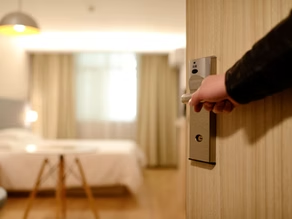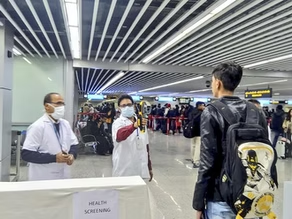Ultimate Guide to Accommodation in India post-Coronavirus

The Coronavirus has made it not only to travel out to any place but the fact that when we look at a new place or a new person, we get that feeling of being scared of catching the virus that our willingness to travel is also gripped. Such an extreme feeling has become really common and the fact that a new place or a new location might have a higher chance of getting a person infected restricts a traveler to even go out of their house. Making this feeling a new normal, traveling to a new place, and staying at that place is going to change for good to push towards safer means of travel. You think you know all about catching Coronavirus? Check this. When we think of staying and sleeping at an accommodation that is not our home, the first thing we think of is how many people have actually been here and used it? Is it really been cleaned after their stay? Or is it even safe from any disease that the person might carry? All of these questions are not just going to be our simple thoughts but a grave concern, a concern that will be needing complete addressing and safety measures that will make sure that these doubts are vanished as quickly as they come inside a traveler’s mind. Leading hoteliers believe that these concerns and risks can be simply taken care of with a few safety precautions and wearing a mask at all times when outside the accommodation. A woman wearing mask the right to stay safe. You can check out the guidelines by the government of India to make face masks at home here and make a mask for all your needs to be safe from Coronavirus. Travel includes staying at a new place(obviously!) and a traveler could have a preference for staying at a posh location that has all the amenities and a person need not even go out of the property to have fun, and a traveler could even have a preference of going with the cheapest closest option to stay for the night or the day and be gone the next morning. However extreme a traveler would want their accommodation preference to be, the coronavirus is set to bring a few changes to all of them. Checking-in to accommodation is the first thing that a traveler has to do to start their stay at a new place. During check-in, there can be several violations of social distancing norms, like touching each other’s documents, handling cash, staying close to the attendant at the reception, standing close to other guests, etc. Having a digital, contact-less check-in will be the new normal in each accommodation, where a traveler will just walk into a hotel and head directly for their room that will be pre-allocated to them before even their check-in. A possible tech-travel solution for this could be, no need to show any documentation or a booking voucher, just QR or bar code on the phone that enables the door and unlocks it for a traveler to enter the hotel premises or the accommodation premises and head straight for their rooms. Think twice before reaching out for the bell! Escalators, lifts, or staircases, which one to prefer? It is pretty much clear that lifts are our worst enemies when it comes to social distancing. Staying in close proximity to a person for longer than 10 seconds is always a factor of risk. So, stairs might be safer than lifts and you can even eliminate the bulk of the threat by not touching anything like the railing or handles and walking at a distance from anyone walking close to you. The common areas like lobby, gyms, pools, spas, etc. will have to be tackled with utmost safety. Since these areas attract a lot of visitors, there is not only a chance of catching the virus from coming in contact with an infected person but from a surface that was in contact with an infected person. These areas will be limiting the number of guests on the floor and ensuring that each area is cleaned off at regular intervals. Swimming pools are much safer when it comes to Coronavirus because chlorine does not let the virus sustain. You can have a chill time at the pool but make sure that there are not a lot of people present and you are still steering clear and swimming at a distance. Although not a lot of hotels have opened swimming pools, it is something to look out for. Swimming pools are not as dangerous as you might think. Eating at a restaurant is going to be a little problematic. Not exactly problematic but very different. There will be a lot fewer customers that would opt to eat out, and even if they do, restaurants need to have a strict policy of how many foodies can even be present at once in the vicinity. The best solution to eating a meal at your favorite restaurant would be to order room service. Sanitizing your hands and eating a meal in your room is the best way to stay safe and eat during a trip when the pandemic is still at large. Getting to the accommodation and checking-in is fine but how do you really stay? Remotes, handles, faucets, toilets, surfaces, room keys, etc. All can carry a potential risk to infect a person from this highly contagious virus. Now we have two options, either you go berzerk and start sanitizing every corner of the room you’ll be staying in, from the handles to the TV, or you make sure that you keep your hands clean every time you want to eat something or do an activity that might involve you touching your face repeatedly. If you’re really paranoid, sanitize the hell out of the entire room. Touching door handles? Better sanitize the hell out of
Ultimate Guide to Transportation in India post-Coronavirus

The Coronavirus has surely made us believe that the only constant in life is change, and this change has been life-altering. Every person is now preparing for a post-COVID19 world, a world where safety and survival will be the basic necessities, a world where masks and sanitizers will become more important than water and food, and a world where we’ll think twice before coming in contact with anyone new. It got me wondering how our commute will be different post-COVID, not just daily commute that will be different but how traveling in airplanes and trains will look like? Let’s take a look at how traveling in a post-pandemic world will look like specifically focusing on traveling in India in a post-COVID19 scenario. What a survey of 6000 travelers told us about post-Coronavirus travel The biggest industry when it comes to traveling and transportation is the airline industry. The pre-COVID revenue of the airline’s industry stood at 873 billion dollars in the world, which has now dropped to almost half of it! India had a passenger count of around 160 million in 2017! It’s safe to say that air travel will have the most impact considering the monetary juice it requires to maintain an airline. How will Air Travel in a post-COVID world change? How will the cost of air travel change post-COVID19 is the first thing that comes to our mind. While there is a common misconception that ticket prices are ready to soar, this is not true. Keeping in mind the fact that a traveler will want to choose safety over pleasure, the number of passengers is going to decrease. Not just for leisure, since all the offices have adapted and loved the concept of work from home, business travel will also come down significantly. As a meeting that earlier took hours of traveling and a lot of money can now be easily done by staying at home. Moreover, airlines will have to gain more trust in the travelers and will have to offer huge discounts too. Airport check-in while maintaining social distancing. Digital and Touchless Travel will be the first thing to be implemented in and around the airport and airplane to maintain the norm of social distancing. Digital won’t just mean no physical boarding pass but even the Visa and the Passport might have to go entirely digital to make sure there is no contact between the passenger and the crew at the airport. No peanuts at 35,000 feet anymore. Airlines will stop serving food in the view of Coronavirus being spread through the removal of masks and gloves for eating. So, how will we eat during a flight amidst the Coronavirus? Well, packaged food on airports instead of flight will be the best solution for staying safe. Baggage Sanitizing and screening will become as common as baggage checking. We have already seen some airports in a few countries screen bags using UV rays to check for the possibility of Coronavirus on them. When we think about traveling on an airplane, we never really consider how easy it is to transport our belongings through it but now we’ll miss the days this was true. There might be more checks for baggage and also a restriction on the number of bags each passenger can carry. Travelers with face masks, and shield and crew with PPC. Face masks, shields, and gloves will be the new common while traveling on an airplane. We have had reports of the Indian government making it necessary to wear gloves and masks at airports and have also instructed all the airlines to provide face shields to the passengers. It is a great move by the authorities considering how close a person sits on an airplane. Considering the fact that the middle seat in a flight will not be left empty, having a face mask and shield will have to be necessary. Get ready for Empty Airports and long queues. Airports will have to go a complete overhaul making things work amidst this pandemic. Airports experience maximum footfall as compared to other transportation mediums. At Delhi airport, the busiest airport in India, almost 2 lakhs passengers used to land or depart at the airport. This will change entirely to shift towards empty airports, where people are standing and sitting 3 feet apart, the safe distance for coronavirus. Making the queues long and waiting time high. With passport and boarding pass, health certificates will be a new mandatory document Health checkups and certificates may become mandatory to ensure a smooth flying experience. A temperature gun is not enough to conclude whether a person might be suffering from Coronavirus or not, to make sure we have a process that makes traveling easier in a world where the Coronavirus is like a common cold, airlines and airports can make it mandatory for travelers to have a Coronavirus test done in 7 days and present a certificate for the same for being eligible to travel in an airplane. Airport shops, food courts, and restaurants will dry up and maybe even forced to close to keep this pandemic in check. A major source of revenue for any airport authority, and the reason why early check-ins and coming early to the airport is recommended, are the outlets at the airport. These stores though necessary for the operations of any airport will have to remain shut or operating at minimum capacity. More important than water? Face masks in a vending machine will be very common. Masks, Sanitizers, gloves instead of Pepsi, Lays, Water. Vending machines will change the kind of essentials they process. A lot of travelers will vary from eating or drinking at the airport or even in the flight. Masks, sanitizers, gloves, and other essentials will be the right path to take in order to ensure the safety of travelers, and also generate little sales for the companies. Time to reach the

